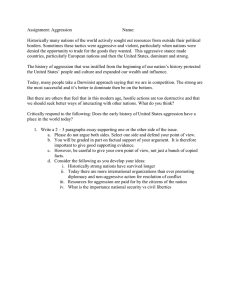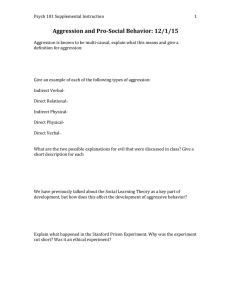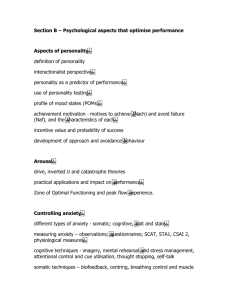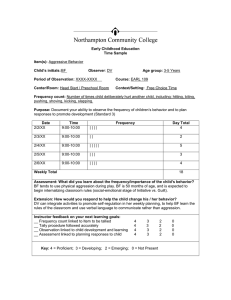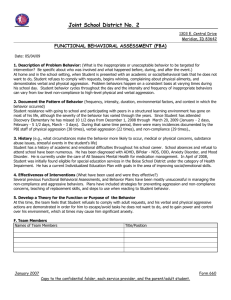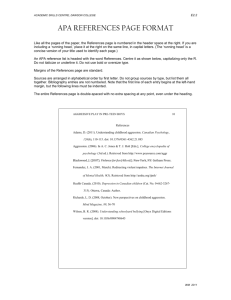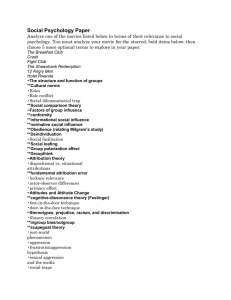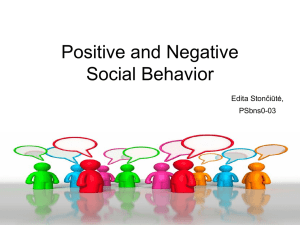2016 Gatlinburg Conference Poster PS-60
advertisement
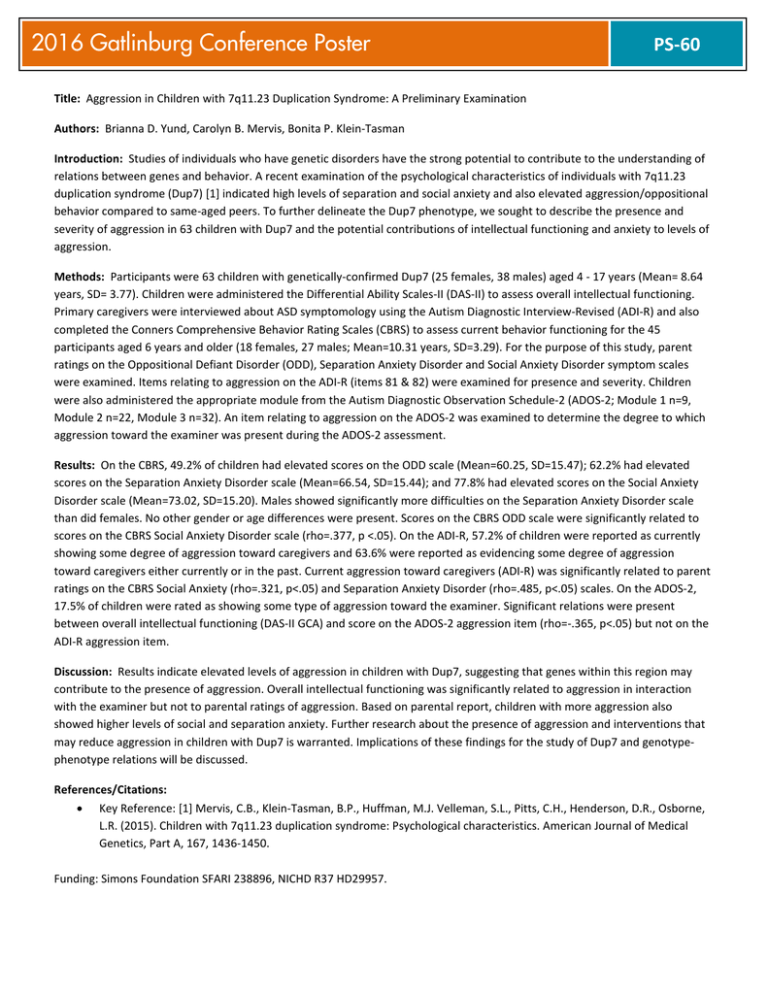
2016 Gatlinburg Conference Poster PS-60 Title: Aggression in Children with 7q11.23 Duplication Syndrome: A Preliminary Examination Authors: Brianna D. Yund, Carolyn B. Mervis, Bonita P. Klein-Tasman Introduction: Studies of individuals who have genetic disorders have the strong potential to contribute to the understanding of relations between genes and behavior. A recent examination of the psychological characteristics of individuals with 7q11.23 duplication syndrome (Dup7) [1] indicated high levels of separation and social anxiety and also elevated aggression/oppositional behavior compared to same-aged peers. To further delineate the Dup7 phenotype, we sought to describe the presence and severity of aggression in 63 children with Dup7 and the potential contributions of intellectual functioning and anxiety to levels of aggression. Methods: Participants were 63 children with genetically-confirmed Dup7 (25 females, 38 males) aged 4 - 17 years (Mean= 8.64 years, SD= 3.77). Children were administered the Differential Ability Scales-II (DAS-II) to assess overall intellectual functioning. Primary caregivers were interviewed about ASD symptomology using the Autism Diagnostic Interview-Revised (ADI-R) and also completed the Conners Comprehensive Behavior Rating Scales (CBRS) to assess current behavior functioning for the 45 participants aged 6 years and older (18 females, 27 males; Mean=10.31 years, SD=3.29). For the purpose of this study, parent ratings on the Oppositional Defiant Disorder (ODD), Separation Anxiety Disorder and Social Anxiety Disorder symptom scales were examined. Items relating to aggression on the ADI-R (items 81 & 82) were examined for presence and severity. Children were also administered the appropriate module from the Autism Diagnostic Observation Schedule-2 (ADOS-2; Module 1 n=9, Module 2 n=22, Module 3 n=32). An item relating to aggression on the ADOS-2 was examined to determine the degree to which aggression toward the examiner was present during the ADOS-2 assessment. Results: On the CBRS, 49.2% of children had elevated scores on the ODD scale (Mean=60.25, SD=15.47); 62.2% had elevated scores on the Separation Anxiety Disorder scale (Mean=66.54, SD=15.44); and 77.8% had elevated scores on the Social Anxiety Disorder scale (Mean=73.02, SD=15.20). Males showed significantly more difficulties on the Separation Anxiety Disorder scale than did females. No other gender or age differences were present. Scores on the CBRS ODD scale were significantly related to scores on the CBRS Social Anxiety Disorder scale (rho=.377, p <.05). On the ADI-R, 57.2% of children were reported as currently showing some degree of aggression toward caregivers and 63.6% were reported as evidencing some degree of aggression toward caregivers either currently or in the past. Current aggression toward caregivers (ADI-R) was significantly related to parent ratings on the CBRS Social Anxiety (rho=.321, p<.05) and Separation Anxiety Disorder (rho=.485, p<.05) scales. On the ADOS-2, 17.5% of children were rated as showing some type of aggression toward the examiner. Significant relations were present between overall intellectual functioning (DAS-II GCA) and score on the ADOS-2 aggression item (rho=-.365, p<.05) but not on the ADI-R aggression item. Discussion: Results indicate elevated levels of aggression in children with Dup7, suggesting that genes within this region may contribute to the presence of aggression. Overall intellectual functioning was significantly related to aggression in interaction with the examiner but not to parental ratings of aggression. Based on parental report, children with more aggression also showed higher levels of social and separation anxiety. Further research about the presence of aggression and interventions that may reduce aggression in children with Dup7 is warranted. Implications of these findings for the study of Dup7 and genotypephenotype relations will be discussed. References/Citations: • Key Reference: [1] Mervis, C.B., Klein-Tasman, B.P., Huffman, M.J. Velleman, S.L., Pitts, C.H., Henderson, D.R., Osborne, L.R. (2015). Children with 7q11.23 duplication syndrome: Psychological characteristics. American Journal of Medical Genetics, Part A, 167, 1436-1450. Funding: Simons Foundation SFARI 238896, NICHD R37 HD29957.
